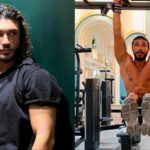Lee Priest has never turned his back on what made him a prolific bodybuilding star–which was intense training and a proper diet. In his latest venture, Priest discussed the challenges of bodybuilding nutrition, keeping the kidneys healthy, and why he never cut carbohydrates completely out of his meal plan.
Having competed in the 1990s and early 2000s, Lee Priest dominated the stage with his extraordinary muscle density and symmetry. Facing off against some of bodybuilding’s most formidable competitors, including eight-time Mr. Olympia Ronnie Coleman, Flex Wheeler, and Shawn Ray, Priest was a force to be reckoned with.
To hone himself into a top-tier contender, Lee Priest learned from legends of the sport, including Arnold Schwarzenegger and Tom Platz. Through their knowledge along with three decades of experience, Priest has an excess of wisdom to share with up-and-coming athletes as well as fans of the sport.
Lee Priest Talks Kidney Health, Breaks Down the Optimal Balance of Protein, Carbs, and Fats for Bodybuilding
In a recent YouTube video, Lee Priest opened up about nutrition as a bodybuilder and how important it is to keep the kidneys healthy.
“So, sometimes it’s not due to you eating the protein, it’s just due to your muscle breaking down and releasing the carotene into your blood. So you have to get your blood checked. Protein, it’s like some people say a gram, some people say if you’re training really hard you need at least two grams per pound of body weight, there’s never really been a scientific study that says this is the exact number.”
He believes one and a half to two grams of protein per pound of body weight is ideal for most bodybuilders.
“If you get around one and a half grams of protein per pound of body weight that’s pretty good. But as far as the other, breaking muscle down, that’s going to happen no matter what” Priest explains.
Due to the release of carotene after exercising, Lee Priest emphasizes the importance of getting regular blood work done to monitor the kidneys. He adds that when he gets checked out by a normal physician, they say his kidney levels are too high. However, when he sees a sports doctor, they say his range is normal for an athlete.
“You have hard workouts and you’re going to get you blood work done, if you had done a heavy back workout one day, the next day you fucking blast legs and go crazy, you’re going to get your blood work done a day or two later, it’s probably going to be through the roof, the carotene levels. A good doctor would know it’s from training and not from, that’s why you should get it done every six months to a year.”
“Normal doctors look at my stuff and they are like oh my god your kidneys are high but then when I go to a sports doctor, they say it’s normal for athletes, we see that all the time.”
When it comes to dieting, Priest had a special approach to keeping his body nourished. A part of that process was never cutting out carbohydrates. Instead, he would eliminate fats, only consuming natural fats found in meat.
“I’ve never cut them out. I knew people that do keto diets and I’ve always said when I dieted, I always — the only thing I cut out or didn’t add were fats. When I was dieting, the fat I would get would just be the natural fats I’d get from the meats or whatever. I never added fats to it.”
Lee Priest explains that he never allowed his carbs to get lower than 250 grams, highlighting that the body needs a balance of carbohydrates, fats, and proteins unless you have a health condition.
“My carbs I never went lower than 250 grams, some people go zero carbs or low carbs but I figure you need protein, you need carbs, and you need a little bit of fat. Everything in moderation unless you got like you’re carb sensitive and you blow up on carbs. Unless you got some sort of health problem that you need to cut them back, you need them.”
Lastly, Priest revealed the backlash he received over indulging his sweet tooth with a tin of peaches. While many people were concerned with the high amount of sugar content, Priest felt he didn’t need to worry about fruits and vegetables making him fat. Not to mention he worked out twice a day and took on two-to-three-hour cardio sessions.
“Show me a fat vegetarian that’s fuckin obese from eating fruit and vegetables. I couldn’t believe it. When I wanted something sweet I’d have the tin peaches in the natural syrup or a bottle of lemonade. They would be like, do you know how much sugar is in that?
I’m like, I’m doing two to three hours of cardio a day; I’m training twice a day. I don’t really think that little bit of sugar in the peaches is going to destroy me or an apple. They go mad.”
When it comes to dieting, Lee Priest has a lot to say on the matter. In the past, he has spoken up against misconceptions surrounding protein intake revealing that not everyone falls under the ‘average person’ category set by ‘textbook experts.’
“I always did two, two-and-a-half grams. People so oh that’s way too much, way too much. I’ve never had a problem with it. Kidneys are fine, liver is fine, everything is fine. They say would the average person only needs one [gram of protein] or a bit under. Who is the average person?”
Priest came to the defense of fitness influencer Sam Sulek after he received backlash for his atypical diet. Lee Priest explained that Sulek is young and therefore can handle a day filled with donuts and chocolate milk. He urged others to leave the influencer alone.
Lee Priest tends to be the whistleblower in the bodybuilding community, unafraid to speak out against anything he believes to be wrong or harmful. As a result, he has found himself in hot water from time to time but that takes nothing away from the incredible wisdom he has to share. Priest continues to advocate for the sport and its athletes, providing only the facts to help support individuals on their fitness journeys.
RELATED: Lee Priest Reflects on Cardio Routine for Contest Preps: ‘If I Ate More, I’d Do Two or Three Hours’
To watch the full video, click the link below:
Tip: If you're signed in to Google, tap Follow.









